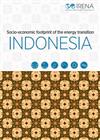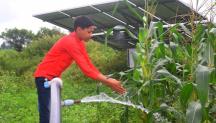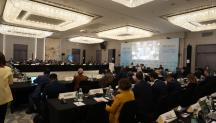

-
-
IRENA (2023), Socio-economic footprint of the energy transition: Indonesia, International Renewable Energy Agency, Abu Dhabi.
Copied
https://www.irena.org/-/media/Files/IRENA/Agency/Publication/2023/Jan/IRENA_Socioeconomic_footprint_Indonesia_2023.pdf
Copied
Socio-economic footprint of the energy transition: Indonesia
Newsletter
With over 270 million inhabitants and more than 17 500 islands, Indonesia is the fourth most populous country in the world and the largest economy in Southeast Asia that relies on fossil fuels. Rapid economic growth has led to a reduction in poverty in recent decades and supported socio-economic development. However, slower global growth, the COVID-19 pandemic, inflation and geopolitical shocks have magnified economic vulnerability in recent times. Indonesia’s geography and heavy economic reliance on natural ecosystems make the country highly vulnerable to climate change. The Asian Development Bank estimates that the costs associated with climate change range between 2.5% and 7% of GDP by 2100, with the poorest in society bearing the brunt of the financial burden and loss of livelihoods.
In an effort to address some of these challenges, Indonesia pledged to achieve carbon neutrality by 2050. A key question is how such a complex transformation affects the well-being and overall welfare of the Indonesian people.
Informed by IRENA’s World Energy Transitions Outlook, this report explores the potential socioeconomic impacts of the energy transition in Indonesia. IRENA’s analysis has shown that a more comprehensive and ambitious energy transition will lead to improved socio-economic outcomes. Under the 1.5°C Scenario, Indonesia is expected to experience 0.5% higher GDP, 2.6% more economy-wide jobs and 8.1% higher social welfare than in the Planned Energy Scenario over the 2021-2050 period. In the renewable energy sector, the energy transition could boost employment substantially, from around 0.6 million currently to around 2 million by 2030 and 2.5 million (mainly bioenergy and solar technologies) by 2050 under 1.5˚ Scenario.
To reap the benefits of the energy transition, a holistic and just transition policy framework must be implemented. This requires concerted action both from within Indonesia, and from international partners to support Indonesia in its transition. Political commitment by Indonesia’s government at all levels will be a significant stepping stone. This should be backed by enhanced co-operation between, and capacity building in, different line ministries, government bodies and implementing agencies, including at the regional and local levels.




